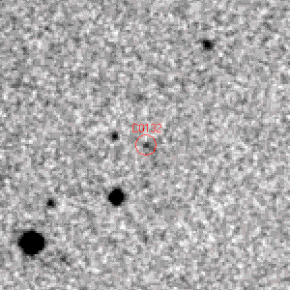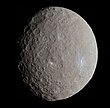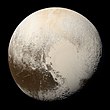(120132) 2003 FY128
Appearance
 | |
| Discovery | |
|---|---|
| Discovered by | NEAT |
| Discovery date | 26 March 2003 |
| Designations | |
| (120132) 2003 FY128 | |
| none | |
| detached object[2] | |
| Orbital characteristics[3] | |
| Epoch 13 January 2016 (JD 2457400.5) | |
| Uncertainty parameter 3 | |
| Observation arc | 8159 days (22.34 yr) |
| Aphelion | 62.551 AU (9.3575 Tm) |
| Perihelion | 37.066 AU (5.5450 Tm) |
| 49.809 AU (7.4513 Tm) | |
| Eccentricity | 0.25584 |
| 351.53 yr (128397 d) | |
| 28.257° | |
| 0° 0m 10.094s / day | |
| Inclination | 11.757° |
| 341.68° | |
| 175.26° | |
| Earth MOID | 36.0755 AU (5.39682 Tm) |
| Jupiter MOID | 31.6621 AU (4.73658 Tm) |
| Physical characteristics | |
| Dimensions | 460±21 km[4] |
| 8.54 h (0.356 d) | |
| 0.079±0.010[4] | |
| 4.8[3] | |
(120132) 2003 FY128 (provisional designation 2003 FY128) is a trans-Neptunian object with a diameter of about 460 km.[4] It orbits the Sun at a distance of about 49.81 astronomical units.[3] It was discovered on 26 March 2003 by the NEAT program at the Palomar Observatory, California.
Classification
[edit]It is classified as a detached object by the Deep Ecliptic Survey (DES), since its orbit appears to be beyond the current control of Neptune.[2] Though, if Neptune migrated outward, there would have been a period when Neptune had a higher eccentricity.
References
[edit]- ^ Lowe, Andrew. "(120132) 2003 FY128 Precovery Images". andrew-lowe.ca.
- ^ a b Marc W. Buie (2006-04-02). "Orbit Fit and Astrometric record for 120132". SwRI (Space Science Department). Retrieved 2009-01-22.
- ^ a b c "JPL Small-Body Database Browser: 120132 (2003 FY128)" (last observation: 2006-04-02). Retrieved 7 April 2016.
- ^ a b c Santos-Sanz, P.; Lellouch, E.; Fornasier, S.; Kiss, C.; Pal, A.; Müller, T. G.; Vilenius, E.; Stansberry, J.; Mommert, M.; Delsanti, A.; Mueller, M.; Peixinho, N.; Henry, F.; Ortiz, J. L.; Thirouin, A.; Protopapa, S.; Duffard, R.; Szalai, N.; Lim, T.; Ejeta, C.; Hartogh, P.; Harris, A. W.; Rengel, M. (2012). ""TNOs are Cool": A survey of the trans-Neptunian region". Astronomy & Astrophysics. 541: A92. arXiv:1202.1481. Bibcode:2012A&A...541A..92S. doi:10.1051/0004-6361/201118541. S2CID 118600525.
External links
[edit]


